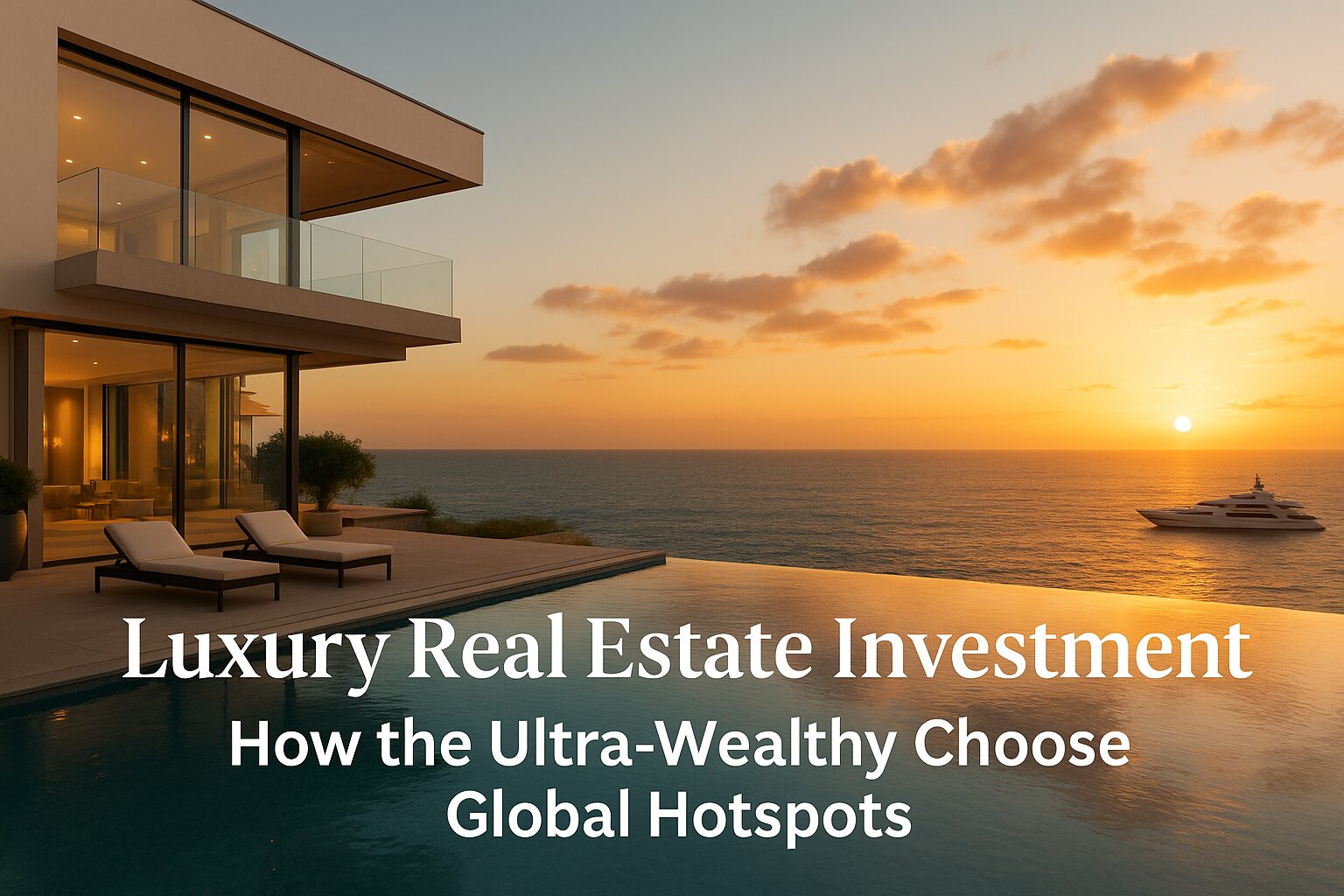Why Luxury Real Estate Is Different
Luxury real estate is not just “expensive property.” For the ultra-wealthy, it is a strategic asset class that blends lifestyle, wealth preservation, and global mobility. These properties serve as safe havens in uncertain times, store value against inflation, and open doors to exclusive networks. Unlike standard residential real estate, luxury assets have unique market drivers — rarity, prestige, and geopolitical advantages — that make them operate in a distinct investment ecosystem.
2. Defining “Luxury” in Global Real Estate
The threshold for “luxury” varies by region. In New York, a luxury apartment may start at $5 million, while in Lisbon it might be $1.5 million. Key attributes include:
- Prime Location – Exclusive districts, waterfronts, or panoramic views.
- Architectural Significance – Custom design, heritage value, or award-winning architecture.
- Privacy & Security – Gated communities, private access, advanced surveillance.
- Amenities & Lifestyle – Concierge services, private marinas, helipads, and bespoke interior finishes.
The ultra-wealthy do not just buy space — they buy a rare combination of status, comfort, and investment-grade scarcity.
3. The Decision Matrix – How the Ultra-Wealthy Choose Hotspots
High-net-worth individuals (HNWIs) and ultra-high-net-worth individuals (UHNWIs) often rely on a multi-layered decision process that considers financial, personal, and geopolitical factors.
A. Economic Fundamentals
- GDP growth, foreign investment inflows, and currency stability.
- Real estate price appreciation trends over the last decade.
- Liquidity of the luxury segment — ease of selling to another wealthy buyer.
B. Political & Legal Climate
- Strong property rights and legal transparency.
- Low corruption index and political stability.
- Investor-friendly residency or citizenship programs.
C. Lifestyle & Connectivity
- International airports with direct flights to global hubs.
- Presence of Michelin-starred dining, elite schools, cultural institutions.
- High-end retail ecosystem (luxury fashion, art galleries, private clubs).
D. Tax & Residency Advantages
- Jurisdictions like Monaco, Dubai, and the Bahamas offer zero income tax.
- Golden Visa programs in Portugal, Greece, and Spain attract global elites.
- Property ownership linked to permanent residency or fast-track citizenship.
4. Global Hotspot Profiles
Here are some of the most sought-after locations for ultra-luxury real estate investment:
- Monaco – The epitome of tax-free prestige, limited land supply keeps prices soaring. Apartments often exceed $50,000 per square meter.
- Dubai – Rapidly growing luxury market, political stability, and zero personal income tax. Known for penthouses, branded residences, and waterfront villas.
- London – Despite Brexit, remains a safe haven due to its global financial status, elite schools, and historic neighborhoods.
- Singapore – Politically stable, ultra-modern, and a gateway to Asia. Strong currency and transparent property laws.
- Lisbon – Still relatively affordable compared to other EU capitals, with the added benefit of the Golden Visa and a booming luxury rehab market.
5. Case Studies – Strategic Acquisitions
Case Study 1 – Wealth Preservation in Monaco:
A Middle Eastern billionaire purchased a penthouse in Monte Carlo not for rental yield, but to hedge against inflation and gain a prestigious EU foothold.
Case Study 2 – Lifestyle + ROI in Dubai:
An Asian tech entrepreneur invested in a branded residence on Palm Jumeirah, leveraging it as both a holiday home and a short-term luxury rental with high seasonal demand.
Case Study 3 – Legacy Investment in London:
A family office acquired a historic townhouse in Mayfair, aiming for generational wealth transfer and long-term capital appreciation.
6. Risk Management in Ultra-Luxury Investments
Even at the top end of the market, risks remain:
- Overpaying for Brand Hype – Branded residences may be overpriced if not backed by solid resale demand.
- Liquidity Risk – High-value properties may take longer to sell.
- Geopolitical Shocks – Sanctions, sudden tax policy changes, or currency controls.
- Climate Change Impact – Rising sea levels for waterfront estates, stricter building codes.
Smart investors diversify across geographies and asset types to reduce exposure.
7. Entry Strategies for Aspiring Investors
For those looking to enter the luxury real estate market strategically:
- Start with Co-Investments – Partner with family offices or luxury real estate funds.
- Leverage Residency-by-Investment Programs – Combine property purchase with legal residency.
- Target Under-the-Radar Hotspots – Places like Montenegro or Panama offer early-mover advantages.
- Focus on Unique Value Propositions – Historical significance, architectural awards, or properties tied to celebrity ownership.
8. Conclusion – The Intersection of Wealth, Lifestyle, and Strategy
Luxury real estate investment is not about chasing the highest rental yield. It’s about preserving capital, enhancing lifestyle, and ensuring geopolitical flexibility. The ultra-wealthy see property not as a single transaction, but as a multi-generational wealth strategy. By understanding the decision-making matrix they use, even smaller investors can apply similar principles to build a globally resilient portfolio.
